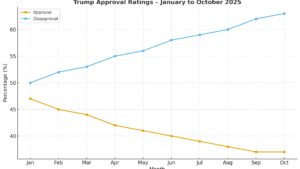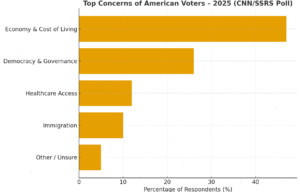🇺🇸 Trump’s Approval Rating Sinks to 37% as Americans Voice Growing Economic Frustration

New polls show deep public concern over the economy, democracy, and presidential power as midterms approach.
Trump’s View of His Second Term: “A Presidency of Success”
Ten months into his second term, President Donald Trump continues to present a confident narrative of progress and achievement. In speeches, interviews, and social-media posts, he touts what he calls a record of “historic wins” — ending prolonged military conflicts overseas, sustaining economic growth, cutting taxes, and reaffirming U.S. strength on the world stage.
From Trump’s perspective, these milestones prove that his leadership is stronger than ever and that America is “back on top.”
Yet the view from the public appears sharply different.
Public Sentiment Turns Sour
A new CNN/SSRS national poll, conducted October 27–30 among 1,245 adults, finds only 37 percent of Americans approving of Trump’s performance — down ten points since February and one of the lowest marks of his presidency. Disapproval now stands at 63 percent, nearly matching his post-January 6 low.
These figures reflect a widening gap between the president’s self-assessment and voters’ daily experience.

What Americans Are Most Concerned About
Nearly half of those surveyed (47 %) said the economy and cost of living were their number-one concerns. Prices for essentials — groceries, gas, housing — have risen steadily, straining working families and retirees alike.
Another 26 % cited “the health of democracy” as their primary worry, highlighting widespread unease about the stability of institutions and the tone of national politics.
By contrast, only 10 % identified immigration as their top issue — a striking shift for an administration once defined by border policy.

Evaluating Trump’s Policies
When asked about specific policies, 61 % of respondents said Trump’s actions had made economic conditions worse, while just 27 % said they had improved them.
On foreign affairs, 56 % said his decisions weakened America’s reputation abroad; 32 % felt they strengthened it.
Confidence in Trump’s ability to manage both domestic and global challenges appears to have eroded, even among some former supporters.
Concerns Over Power and the Constitution
Beyond policy, many Americans worry about how Trump exercises presidential authority.
Roughly 61 % of respondents believe he has overstepped constitutional limits during his presidency — pointing to executive orders without congressional approval, domestic deployment of federal forces, and unilateral military actions overseas.
These perceptions have reignited debates about checks and balances, executive power, and accountability at the highest level of government.
Voters Signal Intent for Midterms
As the 2026 midterm elections draw closer, the poll results could foreshadow political turbulence. Forty-one percent of respondents said they plan to vote in the midterms specifically to oppose Trump, while only 21 % intend to vote in support of him.
That leaves a large portion of voters either undecided or motivated primarily by economic conditions rather than party loyalty.
If these trends hold, analysts say, they could reshape the balance of power in Congress — and test Trump’s influence over the Republican Party itself.
Trump’s Response: “Fake Polls, Fake News”
In trademark fashion, the president dismissed the negative polling on his social platform, Truth Social:
“So many Fake Polls are being shown by the Radical Left Media, all slanted heavily toward Democrats and Far Left Wingers. In the Fair Polls, and even the Reasonable Polls, I have the Best Numbers I have ever had.”
He credited himself with ending eight wars, lowering taxes, keeping inflation down, and “creating the greatest economy in U.S. history.”
For Trump’s loyal base, his rejection of mainstream polls reinforces a long-standing belief that traditional media cannot be trusted. For critics, it underscores a refusal to confront political reality.
Comparing to Past Presidents
Historically, presidents at this stage of their terms have averaged approval ratings in the mid-40s. Trump’s 37 % places him well below that threshold.
In contrast:
-
Bill Clinton hovered near 48 % after ten months.
-
Barack Obama averaged around 46 %.
-
George W. Bush held roughly 49 %.
Trump’s numbers, therefore, represent one of the steepest second-term drops on record, highlighting the intensity of national division.
Broader Implications for the Country
Low approval numbers are more than political trivia. They reveal a deeper unease about the direction of the nation.
Americans cite inflation, uncertainty, and political exhaustion as top frustrations. Many express doubt that Washington — under any leadership — can effectively manage these challenges.
Political scientist Dr. Fiona Marks of Georgetown University told The Capitol Ledger:
“What we’re seeing is not just dissatisfaction with policy, but fatigue with politics itself. Americans feel caught between rising costs and endless conflict in Washington.”
The Midterm Stakes
If the disapproval trend continues, the 2026 elections could serve as a national referendum on Trump’s leadership. Democrats hope to regain momentum by emphasizing economic relief and institutional stability, while Republicans aim to rally the base by portraying Trump as unfairly targeted.
Either way, the outcome will shape the legislative landscape — and potentially determine whether Trump’s final years in office are defined by confrontation or compromise.
Conclusion: Leadership Under Scrutiny
Donald Trump maintains that his presidency is making history for all the right reasons. But the data show a public increasingly skeptical of that claim.
With approval stuck below 40 %, growing anxiety about the economy, and renewed questions over presidential power, Americans appear to be weighing not just the success of one administration — but the direction of the nation itself.
As one Washington analyst put it:
“Every presidency faces a moment of reckoning. For Trump, that moment may already have arrived.”